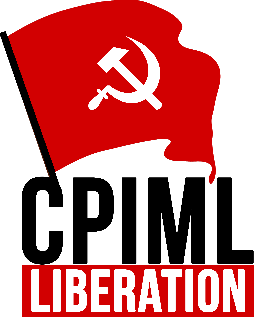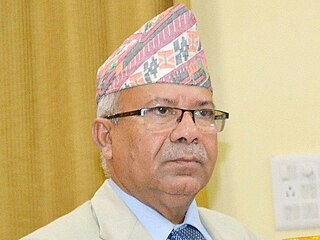
The Nepali Congress is the largest social democratic political party in Nepal. As per the results of recent local election, Nepali Congress stands as the single largest party of Nepal at all levels of government. It is the current ruling party of Nepal since July 2021. With more than one million active members, the party remains the largest party in Nepal by membership.

The Communist Party of Nepal, abbreviated CPN, was a communist party in Nepal from 1949 to 1962. It was founded on 15 September 1949 to struggle against the autocratic Rana regime, feudalism, and imperialism. The founding general secretary was Pushpa Lal Shrestha. The founding members of the Communist Party of Nepal were Moti Devi Shrestha, Niranjan Govinda Vaidya, Nar Bahadur Karmacharya and Narayan Bilas Joshi.

The Communist Party of Nepal is the second largest political party in Nepal. As per the results of recent elections, CPN (UML) stands as the second largest party of Nepal at all levels of government. There have been four prime ministers from the party while the party has led the government five times. CPN (UML) currently serves as the opposition in the Federal Parliament of Nepal and all of the seven provincial assemblies. As of 2021, the party claims to have nearly 600,000 members.

The Communist Party of India (Marxist–Leninist) Liberation also referred to as the Liberation Group, is a Communist political party in India.

The Communist Party of Nepal (Marxist–Leninist) was a political party in Nepal. It was launched in 1978 by the All Nepal Communist Revolutionary Coordination Committee (Marxist–Leninist), which founded by groups involved in the Jhapa movement. The CPN (ML) published Varg-Sangarsh and Mukti Morcha.

The Communist Party of Nepal (Marxist–Leninist) is a political party in Nepal and a splinter group from the Communist Party of Nepal formed on March 5, 1998. Sahana Pradhan was the chair of the party and Bam Dev Gautam the general secretary.

The Communist Party of Nepal (Marxist–Leninist) is a communist political party in Nepal. It was formed by Chandra Prakash Mainali when the Communist Party of Nepal (Marxist–Leninist) reunified with Communist Party of Nepal. Mainali had refused to go along with the merger and led a faction of the former Communist Party of Nepal (Marxist–Leninist) to reorganize the party.

Madhav Kumar Nepal, is a Nepalese politician and former Prime Minister of Nepal. He served as Prime Minister of Nepal from 25 May 2009 to 6 February 2011 for nearly two years.
Chandra Prakash Mainali more commonly known as C. P. Mainali is a communist politician in Nepal and former Deputy Prime Minister of Nepal.
Kamal Prasad Chaulagain is a Nepalese politician. He was elected to the parliament in 1991, then belonging to the Samyukta Janamorcha Nepal. When the Samyukta Janamorcha Nepal split in 1994, he sided with the group of Nirmal Lama.

The Nepal Communist Party, abbreviated NCP is a defunct communist party of Nepal. It was founded on 17 May 2018, from the unification of two leftist parties, Communist Party of Nepal and Communist Party of Nepal. The unification was completed by the Party Unification Coordination Committee, after eight months of negotiation. The two predecessor parties subsequently dissolved, making way for the new united party. The party retained the electoral symbol of the CPN, the sun.

Prakash Man Singh is a Nepalese politician and a leader of the Nepali Congress. He is the son of political stalwart Ganesh Man Singh. He has also served as the Deputy Prime Minister and Minister of Local Development and Federalism in Sushil Koirala's Cabinet.
Indirect presidential elections were held in Nepal in July 2008. The first round of voting was held on 19 July, with a run-off on 21 July. The Nepalese Constituent Assembly (CA) elected in April 2008 elected a new president and vice-president after the Fifth Amendment to the Interim Constitution was passed on 14 July. This would be the first President to be elected after Nepal became a republic a few months earlier.

The Communist Party of Nepal Marxist−Leninist (Samajbadi) was a political party in Nepal. The party was founded on August 6, 2010, through a split in the Communist Party of Nepal (Marxist-Leninist).

The United People's Front of Nepal, abbreviated SJM, was the front of the Communist Party of Nepal, or CPN (UC).

Bhim Acharya secretary of Communist Party of Nepal, is the former Chief minister of Province No. 1. Governor Somnath Adhikari appointed Bhim Acharya as the chief minister as per Article 168 (1) of the Constitution of Nepal after He was unanimously elected parliamentary party leader of the CPN (UML) on 26 August 2021, following the resignation of outgoing chief minister Sher Dhan Rai as both the parliamentary party leader and chief minister. He assumed the post of the Minister for Culture, Tourism and Civil Aviation of Nepal on 25 February 2014 under Sushil Koirala-led government.

Astalaxmi Shakya is a Nepalese politician and former interim Chief Minister of Bagmati Province. She is first woman chief minister of Nepal. Governor Bishnu Prasad Prasain appointed Shakya as the chief minister as per Article 168 (1) of the Constitution of Nepal after she was unanimously elected parliamentary party leader of the CPN (UML) on 18 August 2021, following the resignation of outgoing chief minister Dormani Poudel as both the parliamentary party leader and chief minister.

General elections were held in Nepal in two phases on 26 November and 7 December 2017 to elect the 275 members of the fifth House of Representatives, the lower house of the Federal Parliament of Nepal. The election was held alongside the first provincial elections for the seven provincial assemblies. A political deadlock between the governing Nepali Congress and the winning left-wing coalition over the system used to elect the upper house led to delay in forming the new government. Following the announcement of final result by the Election Commission, K.P. Oli of Communist Party of Nepal was sworn in as Prime Minister on 15 February 2018 by the President according to Article 76 (2) of the constitution. He passed a Motion of Confidence on 11 March 2018 with 208 votes.
Umadhar Prasad Singh was an Indian communist politician. Singh was a leader of the student movement in Bihar, and played a role in building the Naxalite movement in the state. He was imprisoned for eight years. After his release he was elected twice to the Bihar Legislative Assembly.

General elections were held in Nepal on 20 November 2022 to elect the 275 members of the House of Representatives. There were two ballots in the election; one to elect 165 members from single-member constituencies via FPTP, and the other to elect the remaining 110 members from a single nation-wide constituency via party-list proportional representation.












